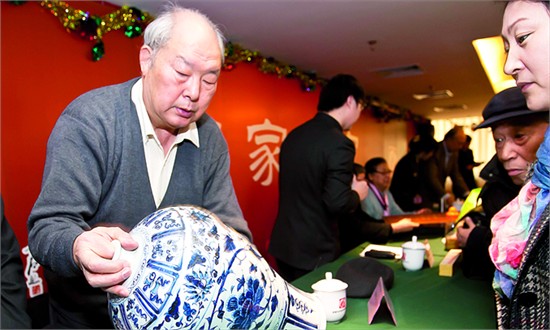
An antique specialist examines a vase amateur collectors have brought to him in a collectors' conference in November 2011. Expert testimonies on the authenticity of artifacts are highly valued but not always correct.
The Forbidden City has issued a statement signaling that it will clamp down on the actions of staff or former staff who become embroiled in schemes to artificially elevate the prices of antiques, or who appraise fake antiquities as being genuine.
According to the statement published on its website on Tuesday, the Palace Museum will distance itself from any individuals violating the rule, and will not take any responsibility for any errors committed.
It follows a number of high profile scandals in which antiquities experts associated with the Palace Museum were found to have wrongly appraised items.
"It's not the first time the Palace Museum has had such rules, and it's just repetition on their part," said Wu Shu, a scholar and author who is devoted to relics protection.
"But the key is how much determination it has and what measures can be taken to stop this phenomenon," he said, while admitting that he is skeptical the rules will have any effect.
The museum should be flexible in its approach to the problem, said Wu, and should not just ban experts from evaluating relics or antiques. The British Museum has an open day when experts appraise relics for the public for free, he said.
Liu Qingzhu, former director with Institute of Archaeology, Chinese Academy of Social Sciences, said that experts can evaluate cultural relics, but they should not give a price, which is beyond their expertise, said Liu.
"They should only comment on the value of relics in three aspects, scientific, historical and literary," said Liu, who believes that if evaluation activities are connected to business, experts will benefit from appraisals.
"The higher the relic's value, the more [money] experts can get," said Liu.
The museum is owned by the nation, and its experts should use their knowledge to serve the country and its people, and not take advantage of its fame to make money, he noted.
Some of those in the evaluation industry do not believe the museum can do anything to prevent its staff, particularly retirees, from working as appraisers.
Zhang Jinfa, manager at Bowan Yaji relics evaluation center, said most experts involved are retired, and they do it under their own name, not in the name of the Palace Museum.
"But when their experience is mentioned, obviously everyone knows they served the well-known organization," he said.
Zhang said that perhaps the government can step in, for example, by officially certifying those who can value antiques.
The State Administration of Cultural Heritage will establish regulations to standardize the antiquities industry, including the system of conducting appraisals, reported the Beijing Times in late March.
Yang Boda, 84, former vice director of the Palace Museum was one of the five experts involved in an antique fraud. A gold thread jade suit was valued at 2.4 billion yuan ($38 million), reported the Beijing News last September.
The five experts valued the suit without opening the glass cover, and were paid 100,000 yuan as a fee. The suit was revealed as a fake, after Niu Fuzhong, a relics expert, admitted he had made it himself, along with a second silver thread jade suit.
A fake jade stool, alleged to date from the Han Dynasty (206BC-220AD), was said to be genuine and its price set at 220 million yuan in January 2011, reported the Xinhua News Agency in February. Zhou Nanquan, another Palace Museum expert, was the appraiser.
The Forbidden City has been hit with a number of unrelated scandals in recent months.
In May 2011, seven items of jewelry lent to it for an exhibition were stolen, and the museum was criticized for allowing one of its buildings, the Jianfu Palace, to be used as an exclusive club. In July 2011, a piece of chinaware, dating from the Song Dynasty (960-1269), was shattered, reported the Beijing News last August.
The Palace Museum would not comment further yesterday.

Copyright ©1999-2011 Chinanews.com. All rights reserved.
Reproduction in whole or in part without permission is prohibited.